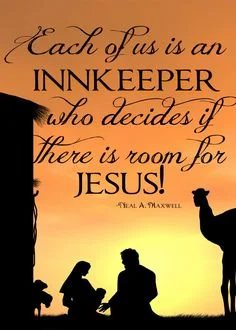by Joanie Butman
Today is the last Sunday of Advent, but is Advent ever really over? If it’s a time of waiting and preparation, doesn’t that describe our entire life? We live in the in-between – a time between the birth of Christ and when He comes again. The challenge is to live by faith, not by sight, trusting Him in the in-between while looking forward with hope to the fulfillment of His ultimate promise when He will “wipe every tear from our eyes. There will be no more death or mourning or crying or pain, for the old order of things has passed away.” (Revelation 21:4)
We all live our lives waiting for something – to grow up, to get our license, to graduate, to get a job, to get married, to have children, to retire, to heal and ultimately, to die. All that remains then is who we are becoming while we’re waiting. Joyce Meyer claims, “Patience is not simply the ability to wait. It’s how we behave while we’re waiting.”
Our life’s journey is discovering who we are (or more importantly, whose we are) and who God is helping us become. Creating the spiritual recombobulation area I discussed in my last post is a vital part of that journey of waiting and discovery – not so God can see you stripped of your outward accoutrements, but so YOU can. As I mentioned last week, it creates a sacred space into which God can enter. It’s where we can set aside our own self-image (negative and/or positive) and learn to see ourselves through the light of His love.
Christ’s birth is an excellent example of how to do this. He emptied Himself of His divinity and became entirely receptive to God’s plan for our salvation. As we attempt to dethrone our own ego, we can look to Jesus for inspiration and strength as we choose to surrender our own will to God’s, knowing that “He must become greater; we must become less.” (John 3:30)
That’s the purpose of Advent – to make room in the inn for Christ’s arrival. We can only appreciate God’s amazing gift of grace through Christ when we are fully aware of how unworthy we are to receive it. As Tim Keller teaches, “The gospel is this: We are more sinful and flawed in ourselves than we ever dared believe, yet at the very same time we are more loved and accepted in Jesus Christ than we ever dared hope.”
Christ’s arrival that first Christmas changed everything and nothing at the same time. There is still pain and suffering, yet there is also light and love. There is a promise of complete restoration along with a not yet. As Avery Dulles explains, “The incarnation does not provide us with a ladder by which to escape the ambiguities of life and scale the heights of heaven. Rather it enables us to burrow deep into the heart of planet earth and find it shimmering with divinity.” Christmas allows us to experience Immanuel, God with us - heavenly moments amidst the chaos of living in the in-between.
Richard Rohr teaches that the “joy that the world cannot give (John 14:27) always comes as a gift to those who wait for it, expect it and make room for it inside themselves.” Will you choose to make room in the inn?





